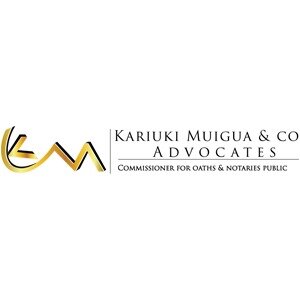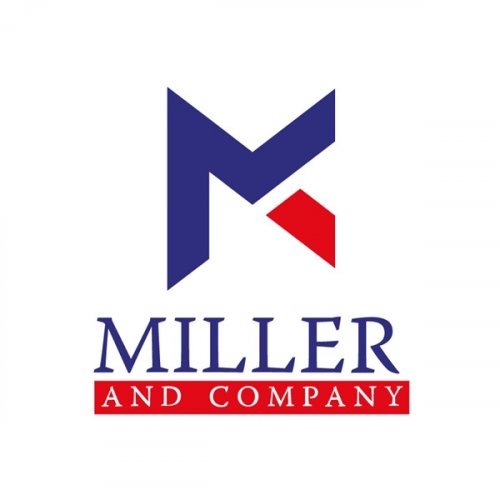Best Intellectual Property Lawyers in Kenya
Share your needs with us, get contacted by law firms.
Free. Takes 2 min.
Or refine your search by selecting a city:
List of the best lawyers in Kenya
About Intellectual Property Law in Kenya
Intellectual Property (IP) law in Kenya is designed to protect the creations of the mind, which include inventions, literary and artistic works, symbols, names, images, and designs used in commerce. The main objective of IP law is to promote innovation and creativity by ensuring creators and inventors are able to reap the benefits from their creations or inventions. In Kenya, IP law is governed by several statutes and administered by the Kenya Industrial Property Institute (KIPI) and the Kenya Copyright Board (KECOBO), among others.
Why You May Need a Lawyer
Engaging a lawyer for intellectual property issues can be essential in several situations. These include when you are filing for patents, trademarks, or copyrights to protect your inventions, brands, or creative works. You may also need a lawyer if you're involved in a dispute over intellectual property rights, such as infringement or breach of license agreements. Additionally, legal guidance can be crucial when negotiating licensing agreements, franchising, or when dealing with cross-border IP issues.
Local Laws Overview
Kenya's IP legal framework consists of several key pieces of legislation that individuals and businesses must navigate. These include the Industrial Property Act, the Copyright Act, and the Trade Marks Act. The Industrial Property Act governs patents, utility models, and industrial designs. The Copyright Act, meanwhile, deals with the protection of literary and artistic works, including software. The Trade Marks Act provides for the registration of marks that distinguish goods and services of different traders. Kenya is also a party to international treaties such as the Paris Convention for the Protection of Industrial Property and the Berne Convention for the Protection of Literary and Artistic Works.
Frequently Asked Questions
1. What is a patent, and how do I apply for one in Kenya?
A patent is an exclusive right granted for an invention. In Kenya, you can apply for a patent through the Kenya Industrial Property Institute (KIPI). The application must include a detailed description of the invention, claims, and any necessary drawings.
2. How long does trademark registration last in Kenya?
Trademark registration in Kenya initially lasts for 10 years. It can be renewed indefinitely for subsequent periods of 10 years upon payment of the prescribed renewal fee.
3. Can I register a copyright in multiple countries at once?
Kenya is a signatory to the Berne Convention, which means that copyright protection is extended to other member countries without the need for further registration. However, enforcement may require additional steps.
4. What is the difference between a copyright and a trademark?
Copyright protects original works of authorship, such as books or music, while a trademark protects symbols, names, and logos used to distinguish goods or services.
5. What is the process for handling IP infringement in Kenya?
If you suspect IP infringement, it is advisable to seek legal advice immediately. The process typically involves gathering evidence, sending cease and desist notices, and possibly pursuing legal action through the courts.
6. What is meant by industrial design protection?
Industrial design protection refers to safeguarding the visual design of objects, which can include the shape, configuration, pattern, or ornamentation. In Kenya, this is handled by KIPI.
7. How can I protect my invention outside Kenya?
To protect your invention internationally, you may apply for patents in individual countries or use international treaties like the Patent Cooperation Treaty (PCT) for streamlined applications.
8. Do I need an attorney to file for IP rights?
While it is not mandatory to have an attorney, legal assistance can significantly enhance the success of your application, ensuring compliance with all legal requirements and helping to navigate complexities.
9. What does IP licensing involve?
IP licensing involves granting permission to another party to use your IP rights, typically under a contract that outlines the scope, duration, and fee for usage.
10. What is the role of KIPI?
The Kenya Industrial Property Institute (KIPI) is responsible for the administration and registration of industrial property rights, including patents, trademarks, utility models, and industrial designs in Kenya.
Additional Resources
For more information on intellectual property, individuals and businesses can refer to the Kenya Industrial Property Institute (KIPI) and the Kenya Copyright Board (KECOBO). These bodies provide a range of services, including information on IP rights and application procedures. Additionally, organizations like the Anti-Counterfeit Authority (ACA) help in the enforcement against counterfeit goods.
Next Steps
If you require legal assistance in intellectual property, it is recommended to consult with an attorney who specializes in this field. You can start by researching law firms that have a strong IP practice or asking for recommendations from industry associations. Once you have identified potential legal partners, arrange consultations to discuss your specific needs and ensure they have the requisite experience and a thorough understanding of both local and international IP law.
Lawzana helps you find the best lawyers and law firms in Kenya through a curated and pre-screened list of qualified legal professionals. Our platform offers rankings and detailed profiles of attorneys and law firms, allowing you to compare based on practice areas, including Intellectual Property, experience, and client feedback.
Each profile includes a description of the firm's areas of practice, client reviews, team members and partners, year of establishment, spoken languages, office locations, contact information, social media presence, and any published articles or resources. Most firms on our platform speak English and are experienced in both local and international legal matters.
Get a quote from top-rated law firms in Kenya — quickly, securely, and without unnecessary hassle.
Disclaimer:
The information provided on this page is for general informational purposes only and does not constitute legal advice. While we strive to ensure the accuracy and relevance of the content, legal information may change over time, and interpretations of the law can vary. You should always consult with a qualified legal professional for advice specific to your situation.
We disclaim all liability for actions taken or not taken based on the content of this page. If you believe any information is incorrect or outdated, please contact us, and we will review and update it where appropriate.
Browse intellectual property law firms by service in Kenya
Kenya Attorneys in related practice areas.
Browse intellectual property law firms by city in Kenya
Refine your search by selecting a city.

















